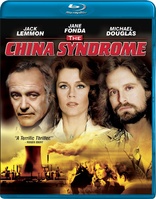The China Syndrome Blu-ray Movie
HomeThe China Syndrome Blu-ray Movie 
Image Entertainment | 1979 | 122 min | Rated PG | Oct 14, 2014Movie rating
7.5 | / 10 |
Blu-ray rating
| Users | 4.2 | |
| Reviewer | 4.0 | |
| Overall | 4.0 |
Overview
The China Syndrome (1979)
While doing a report on energy sources, ambitious reporter Kimberly Wells witnesses a near-accident at a nuclear power plant. Attempting to publicize the incident, Wells soon finds herself entangled in an inquiry by a senior engineer at the plant into possible faults that the power company refuses to acknowledge.
Starring: Jane Fonda, Jack Lemmon, Michael Douglas, Scott Brady, James HamptonDirector: James Bridges
| Thriller | Uncertain |
| Drama | Uncertain |
Specifications
Video
Video codec: MPEG-4 AVC
Video resolution: 1080p
Aspect ratio: 1.85:1
Original aspect ratio: 1.85:1
Audio
English: DTS-HD Master Audio 5.1 (48kHz, 16-bit)
Subtitles
English SDH
Discs
25GB Blu-ray Disc
Single disc (1 BD)
Playback
Region A (locked)
Review
Rating summary
| Movie | 4.5 | |
| Video | 3.5 | |
| Audio | 4.0 | |
| Extras | 3.0 | |
| Overall | 4.0 |
The China Syndrome Blu-ray Movie Review
Life Imitates Art
Reviewed by Michael Reuben October 31, 2014I once had a memorable exchange about The China Syndrome with a poster on an internet movie forum. Although he was barely in kindergarten when the film was released on March 16, 1979, he was utterly convinced that it had permanently stymied the U.S. development of nuclear energy, thereby contributing to decades of dependence on foreign oil and gas. When I pointed out that the more likely cause was the major accident and partial meltdown at Pennsylvania's Three Mile Island nuclear reactor just twelve days after the film's release, the poster conceded that Three Mile Island might have had a small impact, but insisted it was really all about the film. At this point, other posters joined with various expressions (some obscene) of the notion: "Are you kidding?" It may be the dream of every filmmaker to have as much impact on the world as my debate adversary claimed for The China Syndrome, but rarely does a work of entertainment affect public policy directly. Indeed, the makers of the film, including producer Michael Douglas, feared that they would appear to be exploiting the disaster, which took fourteen years and a billion dollars to clean up. Still, it's hard to think of another instance where a topical thriller has so eerily predicted the immediate future. Although the accident portrayed in The China Syndrome isn't an exact match for what happened at Three Mile Island, it was just close enough to make these headline issues of safety protocols and human error feel visceral and immediate. Today, long after the furor has passed, The China Syndrome still holds up, thanks to first-rate performances, a well-crafted script and expert direction.
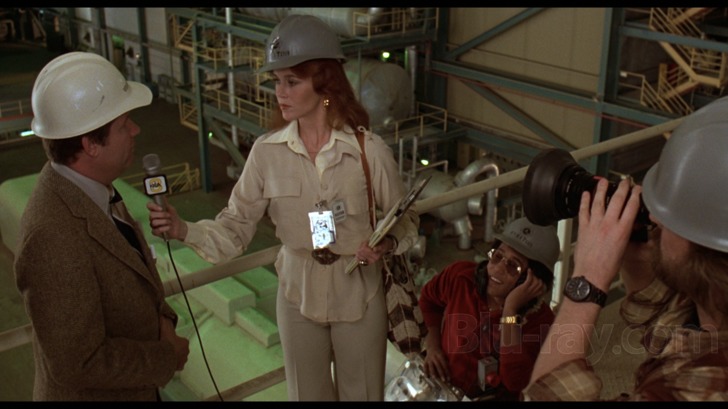
Nuclear energy is only one aspect of The China Syndrome. The films also belongs to a sub-genre, beginning with Network in 1976 and continuing through Broadcast News and even HBO's series The Newsroom, that casts a critical eye on the role of television news on informing the public (or failing to do so). Kimberly Wells (Jane Fonda) is a reporter for a local station in L.A. who has been hired to do "soft" news because of her pretty face. She aspires to do investigative journalism, but the station manager, Don Jacovich (Peter Donat), brushes her off by telling her to stick to what she's best suited for. Her co-anchor, Pete Martin (played by real-life newsman Stan Bohrman), condescends to her on air. Her immediate boss, Mac Churchill (James Karen), won't support her. Kimberly's big break arrives by chance. While taping a "puff piece" special on energy in Southern California with her friend and former colleague, an independent cameraman named Richard Adams (Michael Douglas), Kimberly is given an official tour of the nuclear power plant at Ventana by a PR representative, Bill Gibson (James Hampton) from California Gas & Electric (CG&E). During the tour, however, an earthquake tremor trips the reactor's automatic shutdown procedure (known as a "SCRAM"), and complications lead to a near-disaster that the operators narrowly avert. Richard secretly films the episode from a vantage point above the control room. He and Kimberly are certain they've witnessed a major incident, but they aren't sure what they've seen or what it means. Meanwhile, in the control room below, the shift supervisor, a former nuclear sub commander named Jack Godell (Jack Lemmon), and his friend and assistant, Ted Spindler (Wilford Brimley), are relieved to have avoided catastrophe, and even more so when the Nuclear Regulatory Commission clears the plant and its staff of any wrongdoing. But Godell, a true believer in nuclear energy, remains uneasy. Like Scotty on the Enterprise, Godell knows the "feel" of his plant, and it feels wrong. The further Godell looks into the inner workings of Ventana, the more anomalies he finds in the construction and safety testing. The plant manager, De Young (Scott Brady), doesn't want to hear about it. The business people, as represented by CG&E Chairman Evan McCormack (Richard Herd), want the plant back online as soon as possible. The company has a second plant progressing through federal licensing hearings, and it doesn't want a whiff of trouble to delay the proceedings. Director and co-writer James Bridges (Urban Cowboy ) neatly balances the competing interests, no one of which knows the whole story. The station management knows that CG&E is jumpy about what Kimberly and Richard filmed, but they don't know if it's worth a protracted legal battle, and besides the station has other ways of keeping an audience's attention. CG&E knows there are issues at Ventana, but they think they've been resolved and that the reporter is looking to build a career (which she is). Kimberly and Richard think they've uncovered a huge public safety issue, which they haveóbut not for the reasons they think. And the truly tragic figure of the story, Jack Godell, may have really found a problem, but it's highly technical and doesn't fit easily into a soundbite. Still, it's enough to scare the giant construction company that built Ventana into calling upon their private security force, ruthless thugs who silence threats to the company with whatever violence is necessary. Jack Lemmon's performance as Godell is, to my mind, his finest dramatic film work, superior even to his Oscar-winning role in Save the Tiger. (He was nominated again for The China Syndrome, losing to Dustin Hoffman for Kramer vs. Kramer.) The fervor with which Godell explains to Kimberly the safeguards and backups that make the Ventana plant completely safe, all the while harboring a secret doubt because of a "shudder" he felt during the emergency SCRAM; the intensity with which he investigates his concerns; the crushing disappointment when he realizes that the builders on whose work he has depended cut corners; and the desperation that seizes him when none of his colleagues appreciate the dangeróLemmon conveys all of these with every move of his body, shade of expression and flicker of his eyes. The thoughts show clearly on his face even when he's saying something else, or nothing at all. Screen acting doesn't get any better. By the end of The China Syndrome, Godell has become the opposite of the reliable company man we met at the beginning, and yet at heart he's the same firm believer in the potential of nuclear energy he always was. It's the rest of the world he sees differently.
The China Syndrome Blu-ray Movie, Video Quality 
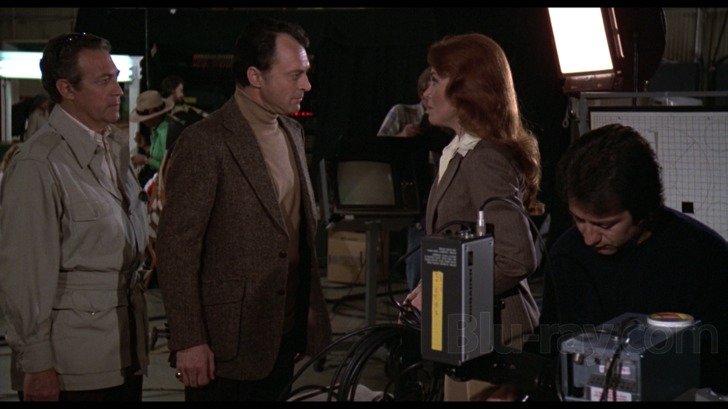
The China Syndrome was shot by James Crabe (Rocky and The Karate Kid), who, as described by executive producer Bruce Gilbert, had no discernible style but, like a traditional studio cameraman of old, suited his lighting to the material. The production's biggest challenge was to simulate both exteriors (via matte paintings and other trickery) and interiors (with meticulous set design) of the Ventana nuclear plant, since no real plant would grant them the necessary access. Image Entertainment/RLJ's 1080p, AVC-encoded Blu-ray, from a transfer provided by Sony, is an adequate but underwhelming presentation of the film's visuals. Colors, black levels and contrast all look right, and the film's realistic depiction of Southern California in the late Seventies (including the cheesy TV newsroom) will be a trip down memory lane for anyone who spent time in the region during the period. Where the presentation falls short is in the rendering of fine detail, which is satisfactory in closeups and most medium shots but becomes noticeably soft and fuzzy whenever a long shot appears. There are several possible explanations for this weakness, but the most likely culprit is high frequency roll-off to facilitate the compression of this 122-minute film onto a BD-25. Despite a fair number of visually complex and active scenes, the Blu-ray's average bitrate is 17.94 Mbps because of space limitations, and that is exceptionally low for this particular 1.85:1 image originated on film. Grain remains visible, but that doesn't mean there was no filtering.
The China Syndrome Blu-ray Movie, Audio Quality 
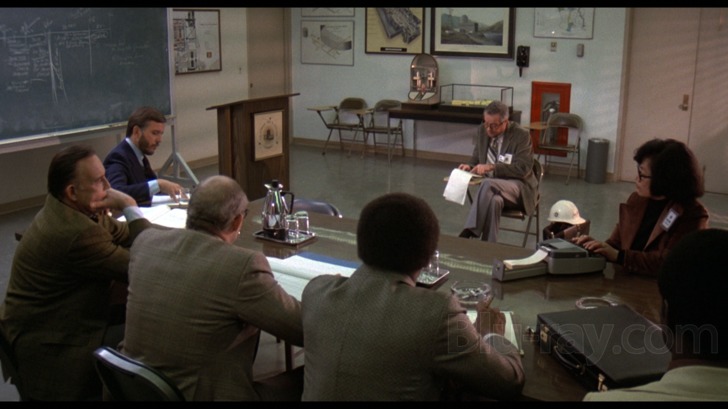
The China Syndrome was released in mono, but the soundtrack was remixed for 5.1 for DVD. The 2004 "Special Edition" from Sony included the original mono track as an option, but the Blu-ray contains only the 5.1 remix, encoded in lossless DTS-HD MA. The remix is conservative and front-oriented, expanding the soundtrack across the front soundstage and adding resonance through the surrounds. The dynamic range is effectively broad, reaching the highs of the klaxons and alarms that are crucial to the impact of the reactor incidents and descending low enough to convey the rumbles of the heavy machinery in which Jack Lemmon's Godell suspects faults. (A scene that cuts back and forth between a piece of machinery being tested, and Godell and his colleagues watching it on a monitor, provides a wonderful demonstration of the use of silence in sound editing.) As described in the "Creating a Controversy" featurette, a score was composed but ultimately rejected in favor of sound effects and source music. The only exception is the Stephen Bishop song, "Somewhere in Between", which plays over the opening.
The China Syndrome Blu-ray Movie, Special Features and Extras 
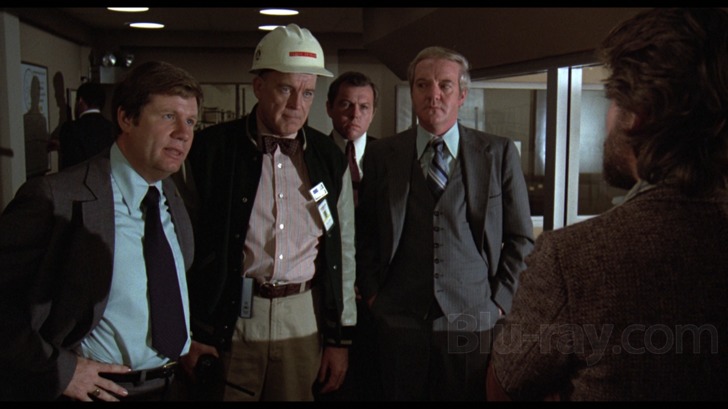
Sony first released The China Syndrome on DVD in 1999, accompanied by its famous teaser trailer, which exploited the then-unfamiliar title phrase to suspenseful effect. In 2004, Sony released a "Special Edition" DVD that included two retrospective documentaries, which have been ported over to this Blu-ray from Image Entertainment. Unfortunately, the teaser trailer is not included, but it is discussed and partially replayed in the "Creating a Controversy" featurette. The 2004 DVD also lists "deleted scenes", but it is not clear whether this refers to a separate extra or the various deleted scenes included in the second featurette.
- The China Syndrome: A Fusion of Talent (480i; 1.33:1; 27:35): Michael Douglas describes how, after winning the Best Picture Oscar for producing One Flew Over the Cuckoo's Nest, he received an early version of the screenplay for The China Syndrome and began developing the project. Other interviewees include Jane Fonda, executive producer Bruce Gilbert, actor Jack Larson (best known as Jimmy Olson on TV's Superman and speaking for his late partner, director James Bridges) and actors Peter Donat and James Karen The most interesting element of this featurette is the account of how two separate projectsóone about nuclear power and another about TV newsówere effectively melded into a single story, primarily by Bridges as writer and director.
- The China Syndrome: Creating a Controversy (480i; 1.33:1; 29:33): The same interviewees discuss the controversy that surrounded the film both during filming and immediately after its release, at a time when nuclear power was already a subject of public debate. The subsequent events at Three Mile Island raised the controversy to a new level of intensity.
The China Syndrome Blu-ray Movie, Overall Score and Recommendation 
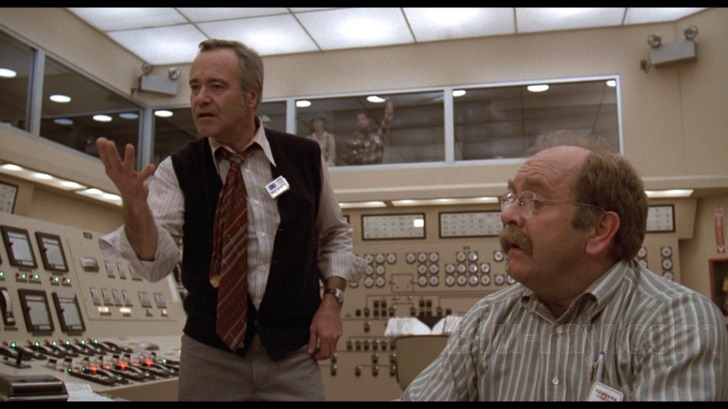
The technology is dated, the media landscape has been transformed, and the energy industry has certainly become more complex, but The China Syndrome remains a tense and involving thriller. The underlying issues haven't disappeared. The same tension between public safety concerns, corporate profitability and the role of government regulation that drive the film's plot continues to play out today in multiple arenas, as does the tug-of-war between investigative journalism and news-as-entertainment (except that much of what passes for "journalism" is now just entertainment by another name). Behind it all, there are no doubt still people like Lemmon's Jack Godell, trying to do the right thing, and not always sure what it is. The video presentation isn't all it could be, but the film is highly recommended.
Similar titles
Similar titles you might also like

The Parallax View
1974

Black Sunday
1977

Q & A
1990

All My Sons
1948

Farewell, My Lovely
1975

The Big Heat 4K
1953

Money Monster
2016

Truth
2015

True Confessions
1981

Hidden Agenda
1990

Electra Glide in Blue
4K Restoration
1973

Witness 4K
Standard Edition
1985

The Turning Point
1952

Boomerang
1947

Affliction
1997

Save the Tiger
1973

Cockfighter
1974

The Cassandra Crossing
1976

Leave Her to Heaven
1945

Each Dawn I Die
Warner Archive Collection
1939
